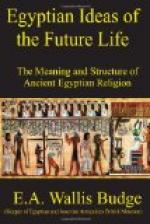33. “Hail Neb-abui (i.e.,
Lord of horns), who comest forth from
Sauti, I have not committed fraud, [and
I have not] looked upon evil.
34. “Hail Nefer-Tem, who comest
forth from Ptah-het-ka (Memphis), I
have never uttered curses against the
king.
35. “Hail Tem-sep, who comest
forth from Tattu, I have not fouled
running water.
36. “Hail Ari-em-ab-f, who
comest forth from Tebti, I have not exalted
my speech.
37. “Hail Ahi, who comest forth
from Nu, I have not uttered curses
against God.
38. “Hail Uatch-rekhit [who
comest forth from his shrine (?)], I have
not behaved with insolence.
39. “Hail Neheb-nefert, who
comest forth from his temple, I have not
made distinctions. [Footnote: i.e.,
I have not been guilty of
favouritism.]
40. “Hail Neheb-kau, who comest
forth from thy cavern, I have not
increased my wealth except by means of
such things as are mine own
possessions.
41. “Hail Tcheser-tep, who
comest forth from thy shrine, I have not
uttered curses against that which belongeth
to God and is with me.
42. “Hail An-[=a]-f (i.e.,
Bringer of his arm), [who comest forth
from Aukert], I have not thought scorn
of the god of the city.”
A brief examination of this “Confession” shows that the Egyptian code of morality was very comprehensive, and it would be very hard to find an act, the commission of which would be reckoned a sin when the “Confession” was put together, which is not included under one or other part of it. The renderings of the words for certain sins are not always definite or exact, because we do not know the precise idea which the framer of this remarkable document had. The deceased states that he has neither cursed God, nor thought scorn of the god of his city, nor cursed the king, nor committed theft of any kind, nor murder, nor adultery, nor sodomy, nor crimes against the god of generation; he has not been imperious or haughty, or violent, or wrathful, or hasty in deed, or a hypocrite, or an accepter of persons, or a blasphemer, or crafty, or avaricious, or fraudulent, or deaf to pious words, or a party to evil actions, or proud, or puffed up; he has terrified no man, he has not cheated in the market-place, and he has neither fouled the public watercourse nor laid waste the tilled land of the community. This is, in brief, the confession which the deceased makes; and the next act in the Judgment Scene is weighing the heart of the deceased in the scales. As none of the oldest papyri of the Book of the Dead supplies us with a representation of this scene, we must have recourse to the best of the illustrated papyri of the latter half of the XVIIIth and of the XIXth dynasties. The details of the Judgment Scene vary greatly in various papyri, but the essential parts of it are always preserved. The following is the description of the judgment of Ani, as it appears in his wonderful papyrus preserved in the British Museum.




